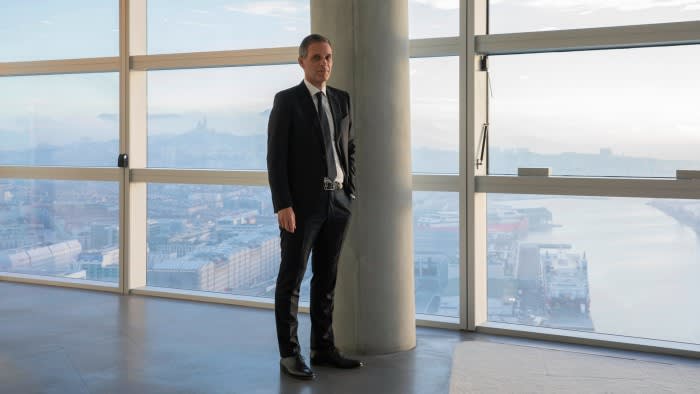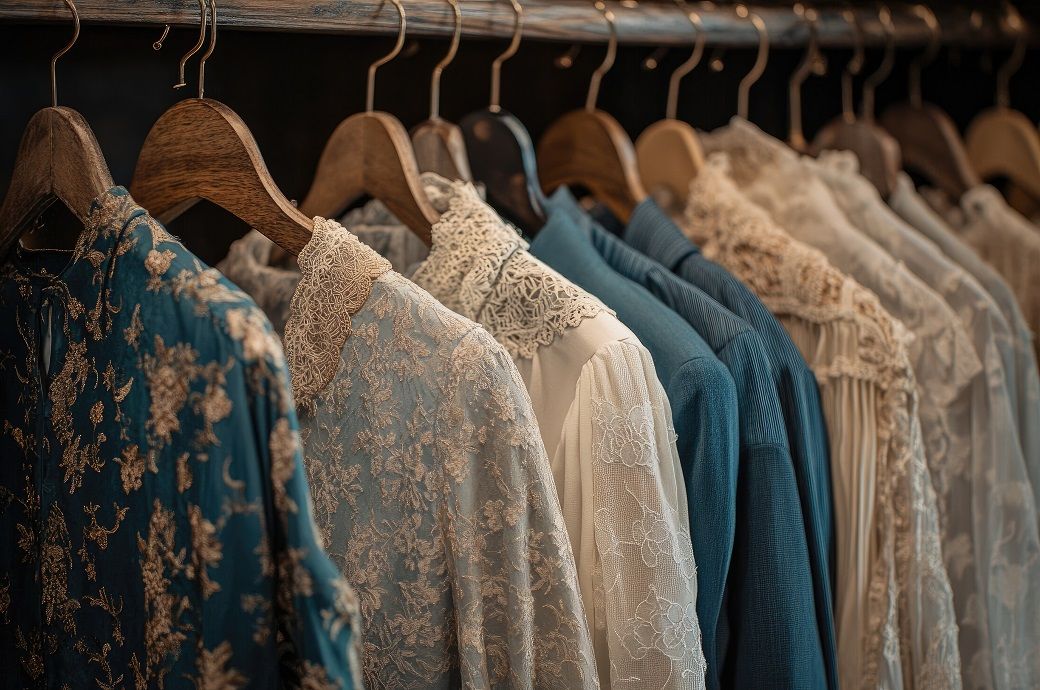The small group of billionaires at the pinnacle of French business that includes LVMH boss Bernard Arnault and corporate raider Vincent Bolloré has lately had to make room for a new kid on the block: shipping tycoon Rodolphe Saadé.
The head of family-owned CMA CGM, the world’s third-biggest container shipping group, Saadé was little known outside the industry until the pandemic brought billions in windfall profits and he started following in the footsteps of other French industrialists by buying up media assets.
Having acquired business newspaper La Tribune and Marseille-based daily La Provence in the past two years, the reserved 54-year-old recently swooped for television news channel BFM. He plans further media expansion, bringing a new spotlight to the unlisted group and its controlling family.
“LVMH, Bolloré, the Dassaults have their own newspapers,” Saadé said in a rare interview in the company skyscraper built by his father that towers over the port of Marseille, where the Lebanese family put down roots in the 1980s. “I have the means to develop a new activity. I think the media, for a group like ours, makes sense.”
Drawing parallels with Arnault, the world’s richest man, is characteristically bold of Beirut-born Saadé, a canny dealmaker and steely negotiator described by allies and adversaries as having big ambitions and appetite for risk. The pair have other similarities: knowledge of the finest details of their operations and an intermingling of their corporations with their families as they groom the next generation.
Xavier Niel, founder of telecoms group Iliad, lost out to Saadé in their battle to buy La Provence, yet they became unlikely friends.
“He didn’t know the big fortunes of France a few years ago and now he does,” said Niel. Describing Saadé as the new entrant in a billionaire’s club rife with codes, he joked: “Like all of us, you need a private jet, the right suit, the right restaurant, legion d’honneur, and your media organisation.”
Flush with pandemic cash, Saadé has taken CMA CGM on a quick-fire, roughly €35bn acquisition spree, with the aim of diversifying into logistics to cushion the group from shipping’s boom-and-bust cycles. He has snapped up planes for a new air cargo division, ports in Los Angeles, and Bolloré’s logistics business, and even his favourite Lebanese pistachio producer.
He has also developed close ties with French President Emmanuel Macron, whom he often accompanies on overseas trips, while investment bankers who once shunned the group now vie for its business.
Media is a small part of the family’s holdings but it brings new influence and new problems. Just as unions protested last year amid suspicions that Arnault had forced out the editor of business newspaper Les Echos, journalists at La Provence went on strike in March when theirs was suspended over a front page criticising Macron’s visit to Marseille to highlight the fight against drug trafficking.
Jean-Christophe Tortora, who leads CMA CGM’s media business, found the headline gave drugs dealers an unduly sympathetic voice. But after an ensuing firestorm in which politicians complained, staff at La Tribune vowed to strike and worries spread to BFM, the editor was quickly reinstated.

Speaking before the furore, Saadé said he had certain expectations of his media outlets: “I would like to have a nuanced approach to coverage — with no extremes — and I want the outlets the group owns to follow that line of conduct.”
But he acknowledged that CMA CGM and the family could no longer avoid the public glare. Although as a family group, “the less people talk about us, the better off we are”, Saadé said, “I’m not going to hide behind my little finger. I can’t say ‘I’m small, don’t look at me’. I’m here and I’m going to live up to that role.”
For Renaud Muselier, who heads the regional council of the southern Provence-Alpes Côte d’Azur region and is close to the Saadés, a shift came when CMA CGM became the main shirt sponsor of football club Olympique de Marseille.
“Until then they had been known above all in business circles, but not a household name,” Muselier said.
The pandemic brought an unprecedented €40bn in net profit in 2021 and 2022 — and a realisation within government that it was strategically important to have a large maritime transport group.
CMA CGM moved masks and medical equipment, and now transports goods into war zones and crisis hotspots for the foreign ministry and French army. When Houthi rebels started attacking ships in the Red Sea last year, the company stuck with the route longer than competitors because its vessels were escorted by the French navy.
The group is now navigating a severe industry downturn brought on by slowing global trade and overcapacity just as it faces what one top executive described as the “generational challenge” of cutting the fleet’s emissions.
The deal-hungry Saadé has turned prudent, although unlike rivals such as Maersk, no job cuts are planned. Saadé also said he did not want the company to go public because it would curb his agility in a volatile industry.
“In a down cycle, our main priority is to control costs,” he said. “The diversification into logistics also helps because it is less capital-intensive and less cyclical.”
Asked if the acquisition spree was over, he hinted that the pace would slow: “We have a lot of important integration work to do . . . a transformation is never complete.”
Saadé learned about business storms when his father took on too much debt during the 2008 financial crisis and almost lost control of the company, forcing the group to sell a minority stake to a Turkish group and secure a government bailout.
“It was formative for me, and I will do everything in my power to not fall back into a situation like 2008,” he said, recalling a time when “we didn’t have many friends” and when he would blast out rock music to psych himself up for negotiations with creditors.
The rise of the Saadés — now ranked 56th on the Bloomberg billionaires index, with a fortune estimated at $28.7bn — is defined by two events. In the late 1970s late patriarch Jacques Saadé bet that container ships would revolutionise world transport; not long after, the family fled from war-torn Beirut to Marseille.
“Our father brought us over in April 1981. I’ll never forget that date,” said Tanya Saadé Zeenny, Rodolphe’s elder sister who is a high-level executive at CMA CGM. “We lived in a hotel for a year and every day we asked him, are we going back to Lebanon? And we’re still here.”
People close to the Saadés said breaking into French elite circles had not been easy for a provincial group owned by a family with Lebanese roots. Media acquisitions, alongside sponsoring the 2024 Paris Olympics and product placements for CMA CGM containers in the latest James Bond movie, are a way of changing perceptions.
“France is not a melting pot like the US,” said one investment banker. “You cannot minimise what the challenge has been for this family.”
The chosen heir as the elder of two sons, Saadé rose through the ranks of the group and still grills top executives on everything from container pricing to the fill rates of ships in hours-long meetings twice a week.
A certain formality reigns in the tower from which the 620-vessel fleet is tracked — the men usually wear ties and only a handful of veterans of his father’s era call Saadé by the informal tu.
“They work 24 out of 24 hours,” said Muselier. “Business and family, it’s all mixed together and it creates very strong bonds between them.”
Saadé has a reputation for being demanding and impatient, and places a premium on “family values” such as loyalty. Company advisers and insiders recount stories of new hires being fired within days if Saadé felt they would not fit. “There is no point keeping someone if we know quickly that it won’t work,” he told the Financial Times.
Saadé conceded he was not averse to courting fear. On a January trip to Egypt, he quizzed staff on how market share was holding up. “The person in charge told me the decline was 0.13 per cent, which is not a lot but I told him it was enormous and that I was not happy,” he said. “I have to keep people motivated, although the teams do very good work.”
However, Niel described Saadé as “endearing, very family-oriented and humble”, lauding his charitable works in poverty-ridden Marseille, for example with his launch of a tech start-up incubator.
Saadé sees media as a means to ensure the family’s legacy and perhaps attract the next generation to the group. Between himself, Tanya and brother Jacques, who manages CMA CGM real estate, they have five teenagers who are destined to take over.
“After they’ve done their studies and had experiences abroad, I want them to work in the family business,” Saadé said. What if they prefer to go off and be musicians? “That’s fine, it’ll last 10 minutes,” he quipped. “You have to give them a choice, but there are five of them, and we don’t need an orchestra.”












